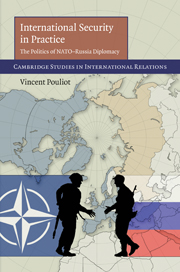1 - Introduction
Published online by Cambridge University Press: 03 May 2010
Summary
What if we adopted a different perspective on international security – one that stresses the practical logics of day-to-day diplomacy? More specifically, what if we conceived of interstate peace less as an abstract category than as a particular way to engage with the world of diplomacy? On the ground of international politics, how do daily interactions between representatives whose states are at peace differ from those of rival states? What makes a given international practice more or less commonsensical in certain contexts but not in others? How are pervasive power relations and domination patterns expressed, in and through practice, on the international stage? In brief, what can we learn by adding to our theories and social scientific interpretations the practical perspectives of those agents involved in the quotidian unfolding of international security?
In this book I argue that, in practice, interstate peace rests on self-evident diplomacy. When security practitioners engage in the non-violent resolution of disputes as if it were the axiomatic way to go, they come to debate with diplomacy but not about its opportunity. Diplomacy becomes commonsensical – the practice from which all further interactions take place. Building on Pierre Bourdieu's sociology, I show that this peaceful commonsense is made possible by the contingent alignment between the practitioners' dispositions (the stock of background knowledge accumulated from experience) and their positions in the field of international security (defined by evolving rules of the game and stocks of valued resources).
- Type
- Chapter
- Information
- International Security in PracticeThe Politics of NATO-Russia Diplomacy, pp. 1 - 8Publisher: Cambridge University PressPrint publication year: 2010

